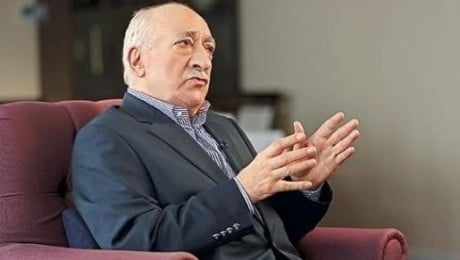News

Was there a sincere alliance between the Gulen Movement and Erdogan?
NRT correspondent Huner Anwer interviews Fethullah Gulen in his Pennsylvania residence ask the crucial question on alliance between the Gulen Movement and Erdogan. Gulen says, briefly, there has never been sincere alliance between them but the movement supported Erdogan as long as Erdogan stayed in line with democratic values and honored rule of law.

Local Turks [in Chicago] fear for safety of friends, family overseas after failed coup
“You see the pictures, ears cut off, eyes are bruised and noses are broken; they’re putting those pictures out,” Parlak said. “(Erdogan is) saying to the whole world, ‘I have the power and I’m going to do anything in my power and nobody can stop me,’ and that’s the part that is scary.”

Dialogue Institute provides insight in Kansas City area on Turkey
Erdogan contends the failed takeover was inspired by cleric Fethullah Gulen, now in voluntary exile in the U.S. Erdogan is systematically trying to eliminate Gulen’s followers and has asked the U.S. to extradite him. Gulen has emphatically denied any involvement in the coup attempt and has suggested that it was staged as an excuse for Erdogan to stop dissenters. Gulen’s history suggests he is more humanitarian than militant.

Biden in Turkey: Holding the Line on Human Rights
This week, Vice President Joe Biden will travel to Turkey to meet with President Erdogan and Prime Minister Yildirim. This is one of the last opportunities for the Obama Administration to emphasize face-to-face how important it is to honor human rights and rule of law in the wake of the attempted coup of July 15.

Turkey’s ‘terrorists’ active in India. But who are they really?
Interestingly, Gulen was once an important ally of President Recep Tayyip Erdogan, and going by his ideology, comes across as a more moderate figure than Erdogan, who has been pushing an Islamic ideology which has little space for secularism. Till very recently, Erdogan’s policy being criticised for allegedly allowing Turkish territory to be used by terrorists.

The aftermath of the failed Turkey coup: Torture, beatings and rape
The Turkish government has embarked on a crackdown of exceptional proportions, targeting people it accuses of being linked to Fethullah Gülen – a Turkish cleric in exile in the US, who the government accuse of masterminding the failed coup on 15 July 2016. More than 10,000 people have been detained since the attempted coup and […]

Fethullah Gülen’s message of condemnation and condolences for victims of the terrorist attack in Gaziantep, Turkey:
I condemn, in the strongest terms, the barbaric terrorist attack on attendees of a wedding ceremony in Gaziantep, Turkey that took the lives of more than fifty citizens, including children, and wounded many others.

Gulen Followers Living in Europe Receive Death Threats, Feel Intimidated
Turks who live in Germany, Belgium, the Netherlands, France and Switzerland and have links to the co-called Gulenist movement say they are frightened amid Turkey’s crackdown on Gulen’s followers, according to media reports. MOSCOW (Sputnik) — Some Turkish people living in Europe who have links to supporters of Fethullah Gulen, accused by Ankara of masterminding the July 15 thwarted coup, have […]

Erdogan drags Turkey toward totalitarianism
Though the attempt ultimately failed, its aftermath and the president’s swift response have the potential fundamentally to shape Turkey’s future as a democratic nation. The all-encompassing, repressive nature of these actions is deeply worrying. All signs point to Erdogan seizing on the opportunity provided by the attempted insurrection, using it as justification to fully consolidate his power over Turkey.

17 Nigerian-Turkish schools caught in Ankara coup crossfire
The Turkish president actually requested 170 countries where the schools are established and run for the same favour, but while only two, including Somalia, obliged on the grounds of their indebtedness to Turkey, the other countries have either refused or are undecided as they asked for proof of Erdogan’s claim.

Tanzania dismisses Turkish gov’t allegations concerning Feza schools, asks for proof
Tanzania has dismissed an allegation by Turkey that the Feza schools in the country are being used to radicalise the youth and fund opposition against the Ankara government. Stung by a failed coup last month, Turkey has targeted businesses associated with Fethullah Gulen, a Muslim Cleric it wants extradited from the US to face charges in Ankara of plotting the coup and funding terrorism activities.

Fethullah Gülen condemns the terrorist attack in Gaziantep, Turkey
I condemn, in the strongest terms, the barbaric terrorist attack on attendees of a wedding ceremony in Gaziantep, Turkey that took the lives of more than fifty citizens, including children, and wounded many others. This is not just an attack on the attendees of a wedding, but also an attack on the solidarity of people of Anatolia, including Turks, Kurds, Arabs, Boshniaks, Albanians, Georgians and Circassians and others who lived as neighbors for centuries.

Irvine’s new arrivals — Turkish asylum seekers, after a failed coup and a sadly successful purge
The man, who ran a nonprofit that provided humanitarian aid, doesn’t want to be identified because he fears for the safety of the wife and two children he was forced to leave in Turkey. They are hidden in a different city, he said, not far from his hometown. They’ve thrown away their cellphones and erased their social media accounts for fear of being tracked down by a government that no longer welcomes them.

Coup attempt in Turkey puts Tulsa Turks in difficult position
Muhammet Ali Sezer, the incoming executive director of the Raindrop Turkish Cultural Center, said it will be impossible for him to return to his homeland unless the political situation improves. “If I go back to Turkey, I don’t know what they will do to me,” said Sezer. He also said he fears for his father and brother who live in Turkey.


















